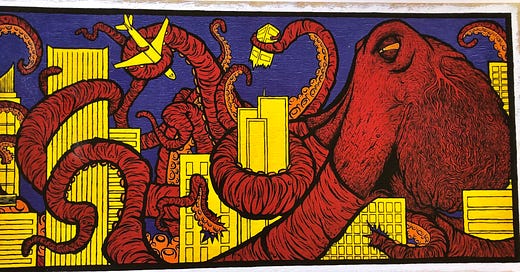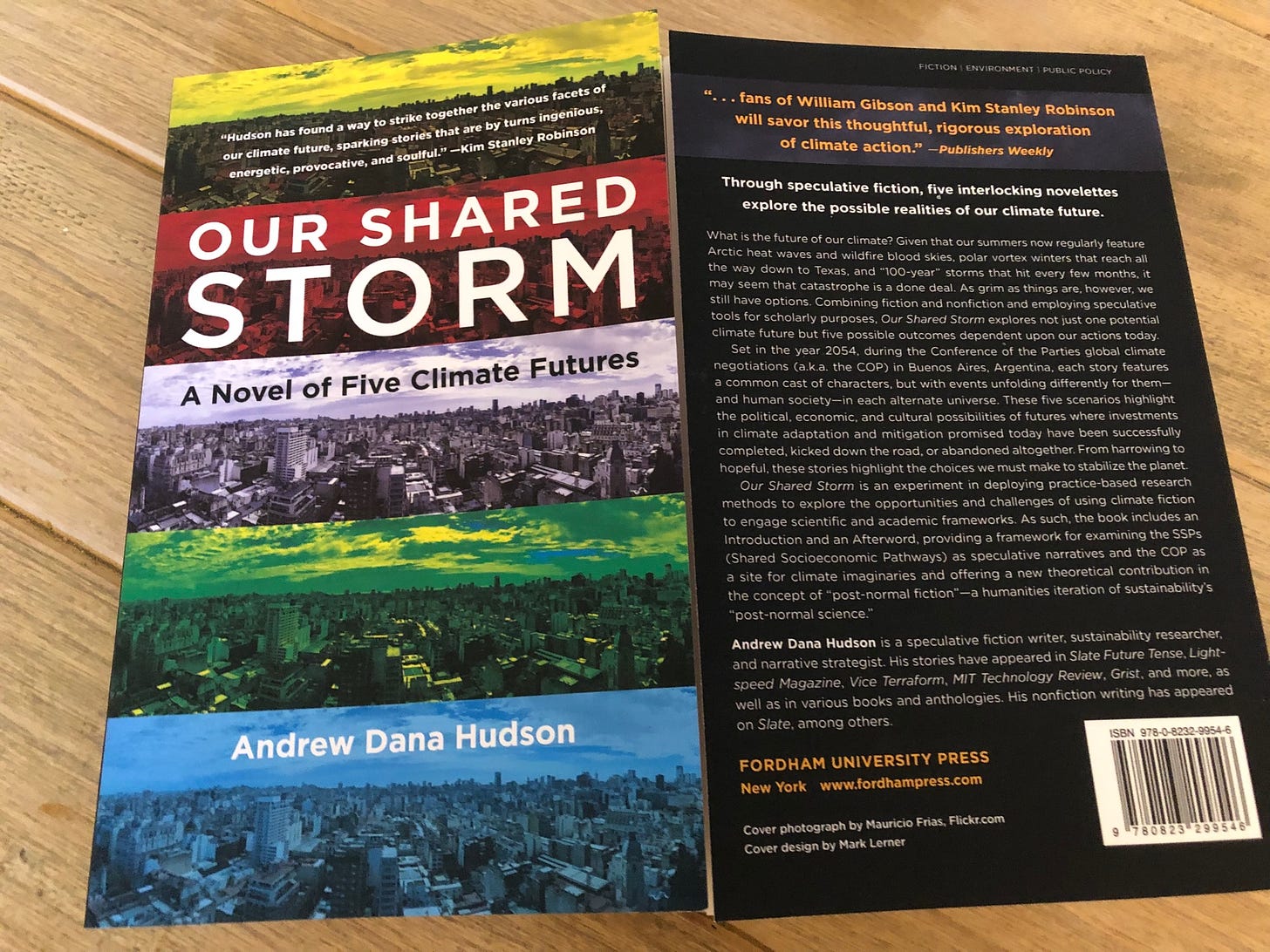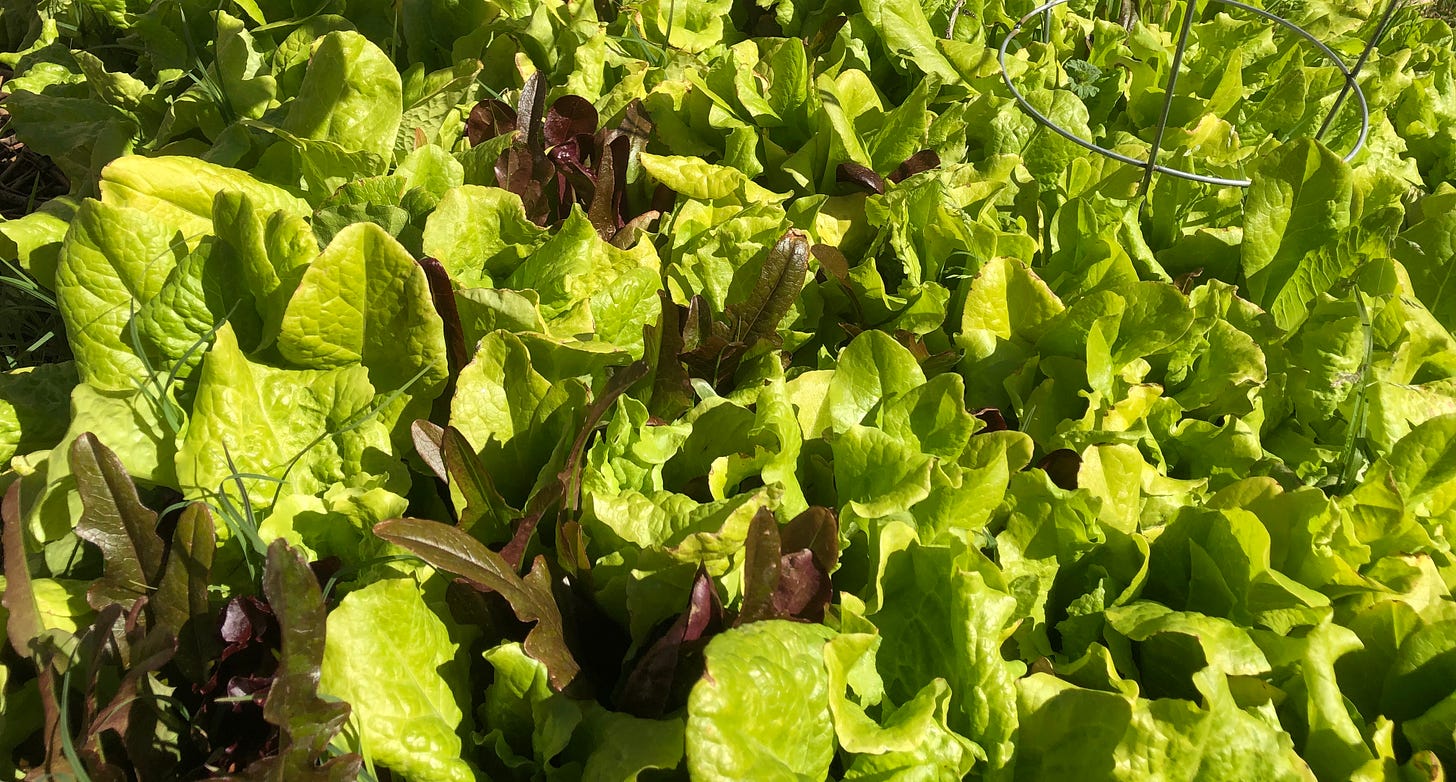Below is the third of five excerpts from my upcoming book Our Shared Storm: A Novel of Five Climate Futures (previous two here and here). The book illustrates a set of climate scenarios——the Shared Socioeconomic Pathways (SSPs)——and the culture of the global climate negotiations (aka The COP) in each. SSP4 is the inequality scenario, in which climate impacts exacerbate wealth disparities between nations and people. Saga, a climate refugee turned surrogate for a plutocrat negotiating at the COP, finds herself kidnapped by a favela gang, whose leader is the charismatic Luis.
“You really from a camp?” Luis asked her Friday evening.
“Six years,” Saga nodded. The maybe-sister was looking at her curiously from a ways behind Luis. She wore an oversized charity-cotton tee, which had been spray-painted with a graffiti stencil that made a rainbow-colored giraffe. Saga noticed the distinctive Bill & Melinda Gates Foundation ampersand between the giraffe’s legs. “I was a little younger than her when I left.”
The girl picked up on Saga’s attention and came closer, sat down and hissed excitedly in Luis’s ear. Luis scowled, but said to Saga, “What was it like?”
“At first it wasn’t so bad,” Saga said, deciding that with the girl present this was an opportunity to appeal for good will. “Lots of people making the best of a hard situation. We’d moved a lot, since losing our flat, living with relatives, so the camp seemed like just another stop on that trip. And they tried to make us comfortable. There were all these little touches of—you know ‘hygge’? Comodidad. Not much room, but warmth, bright design, for a while. I don’t know. Maybe I was too young to notice what was shit, or people protected me.”
She sent a significant look at Luis’s sister, then continued.
“But the storms kept coming, and the people kept coming. Things got crowded. And even that, I think could have been okay. But outside the camp, something changed. The country stopped feeling sorry for us. We were Swedes, their neighbors, but they stopped seeing us that way. We became alien. Lazy leeches. Then disease came, and all their fears were confirmed. The austerity became asperity—harshness. The camps became punishment, you know? For being unclean and dangerous. It was a shock to my parents, I think, losing their sense of country.”
“They still there?”
“The camps? Not exactly.”
“I mean your parents.”
Saga shook her head. “Cholera. Where are yours?”
Luis glanced at his sister, but neither of them answered. “Why’d you leave?” he asked instead.
“Why?” Saga was baffled by the question. “Who wouldn’t want out? I hustled, made myself needed to those in charge, found openings to get myself noticed. A visiting dignitary saw my potential. She sponsored me to go to a real school. It was a very lucky chance.”
“Did you ever go back?”
“By the time I finished my education, there was not much to go back to. Eventually people left, or stayed and were absorbed into the periphery. There had been a belief that the refugee system would get people back on their feet when the crisis ended. Give them real housing, compensation. But eventually people realized that wasn’t coming, and they found their own ways to stabilize, somehow. Just, much poorer than they had been before Thor’s Year.”
"What about those people that protected you? You do anything for them?”
Saga felt herself being drawn into a trap here. In trying to earn sympathy with her story, she had played on Luis’s ideological turf. Now he was rounding on her.
“I don’t feel guilty about surviving,” she said, trying to take the accusation head-on. “Or about taking my shot to get a new life. I didn’t have a choice. Everyone would have done what I did, if they could. Now I have put myself in a position to make things better for people all around the world.”
“You mean now you work for the plutes,” Luis said. “That’s the problem, mina. When you serve just yourself, you end up serving them.”
“You think I should have done what you did? Start a gang, run the slum, start kidnapping anyone just a bit better off? What’s your alternative?”
Luis gave his lopsided shrug. “My alternative is solidarity. Until you have that, everything you do will be just ‘surviving.’”
“I have solidarity with the future,” Saga bristled again. “We are close to getting the runaway train of civilization under control. The rationing and investment since Davos has swerved emissions dramatically, and in another COP or two, we may have the political tools to begin deep afforestation and sequestration. That means a better, more stable future for both your world and mine. What else do you think the COP is for?”
“I think everyone in your better future is going to wonder why my world didn’t fuck up your world when we had the chance——before the walls went up. I know I do. Forty years of the powers-that-be doing nothing, and people just kept behaving themselves. Where was the eco-terrorism? The sabotage of pipelines and power plants? The bombs at petro-banks? The COP held hostage at gunpoint?”
Saga took a moment to digest this. It was, oddly, a sentiment she occasionally heard whispered by COP attendees as well, drinking champagne or scotch after hours, when long negotiations had worn down everyone’s sense of propriety.
“I don’t think that would have helped,” she said eventually. “You may not like it, but real climate action began when elites decided future generations mattered more than contemporary people who were already beyond saving. Now, if we are very lucky, our grandchildren won’t have to go through what I did——what we did. When the storm passes, we can work on solidarity.”
“It’s only a storm for some, mina,” Luis said. “You're still talking like you know us, like we’re the same. But if you walk up to those big walls with that suit and that badge, they’re gonna let you in. I don’t think we’re going through the same thing.”
Our Shared Storm comes out April 5. Here’s a handy button 👇
It’s Alive
Got my author copies in. Wild to see the book as a Physical Object in my house. Both because that means it’s really real and because now I absolutely can’t tweak the back cover copy, which I really should have looked at one more time, or anything else. Oh well! Thanks to Stan Robinson for the lovely blurb! Get your copy here.
Art Collection
I saw this mural sized, drawn and painted on a huge piece of wood, at an art show at The Hive, an artsy mixed use spot where, in the Before Times, we did the occasional launch event for new issues of Oasis. The octopus mural was way out of my price range, but I bought a smaller piece from a different artist, a cool mushroom creature I’ll show another week. When I picked up my purchase, the gallery threw in a print of the octopus mural.
I think this is by an artist named Tony Consiglio, though I haven’t been able to find pictures of the mural online to confirm. Tony does seem to be a comic artist, but there’s almost nothing useful online about his work. Instead my reverse image searching and other investigation has produced a pile of circumstantial evidence: 1) the octopus image has been uploaded to teepublic to print apparel, etc. by an account called “doubletony”; 2) the flyer for the “World Beyond” show on this page lists a “Tony Consiglio” among the featured artists; and 3) the illegible signature on the back of the print looks like it might, if you squint, be “T___ C____io.” I leave deciding if this is enough as an exercise for the reader.
Anyway, mostly it’s a cool rampaging octopus for my “creature wall,” evocative of the giant cephalopods that have sometimes represented corporate monopolies in American political cartoon art. But I kind of like the fact that it’s also ungoogleable. Nice to think that I have a piece of something that didn’t leave a big online footprint, that wasn’t grammed into oblivion. The opposite of an NFT, in that way——deeply fungible, its origin real on wood but digitally forgotten.
Material Reality
Lettuce update. After a winter spent trying to protect our garden from birds and frost, in the last few weeks our lettuce patch has reached a kind of critical mass.
It’s rich and dense. Too dense, probably, like a jungle that Lilliputians would need a machete to march through. See, after our debacle with the mulch, C worried that the first seeds she’d put down would be no good. So she put down another crop. But now it seems like both layers of seeds came up.
There’s nothing in the world like being able to eat a salad you picked minutes earlier. Or running out to the garden for a couple leaves to put on a burger or sandwich. Or just plucking a leaf off the plant and putting it straight into your mouth. Garden lettuce is such a better food than the cut-shipped-frozen plastic bags one gets at the grocery and then leaves to molder and go slimy in the back of the refrigerator, or even the “living lettuce” that puts the same process on life support.
It’s amazing how we lump all these things together as “vegetables” when the output of different crops is wildly different. I talked to a neighbor the other day who grows an artichoke plant that produces one artichoke a year. Our tomato plant produced a couple tiny tomatoes. Our lettuce patch has given us baskets and baskets of lettuce, more than we can eat or even give away——and we’re trying, every time a friend comes over, we hand them a grocery bag and make them take a little pick-your-own excursion to the backyard. We’ve tried to thin the ranks a bit, but the adjacent plants just fill into the space within a day.
Still, even this abundance is probably coming to an end soon. We’ve had a couple mid-80s days, and C thinks that as soon as we get up to 90F the lettuce is likely to bolt and turn bitter. By the time real summer heat comes, these weeks of bounty will seem like a dream.







I think the back blurb is fine.
The best way to harvest lettuce in the garden is to pull up the whole plant and the snip off the root. That way you thin it as you pick it.